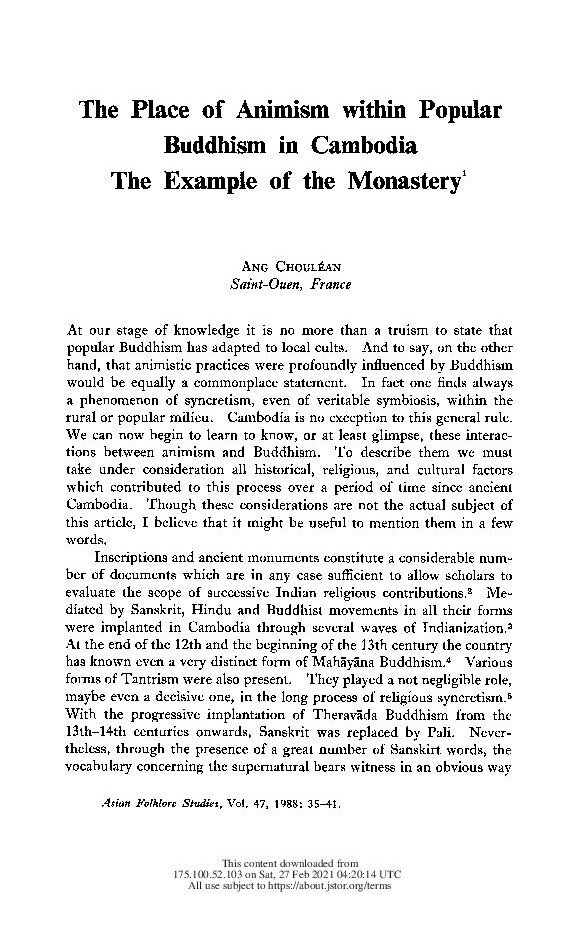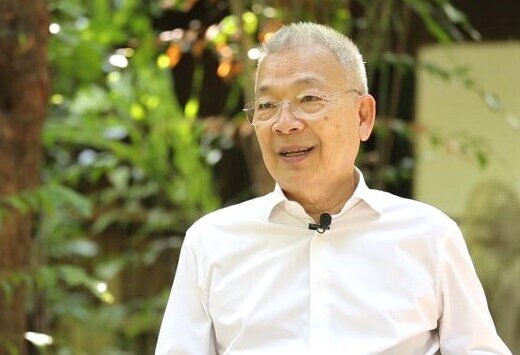The Place of Animism within Popular Buddhism in Cambodia: the Example of the Monastery
by Ang Choulean
The Cambodian monastery as a sacred territory where animist forces combine with Theravada canon.
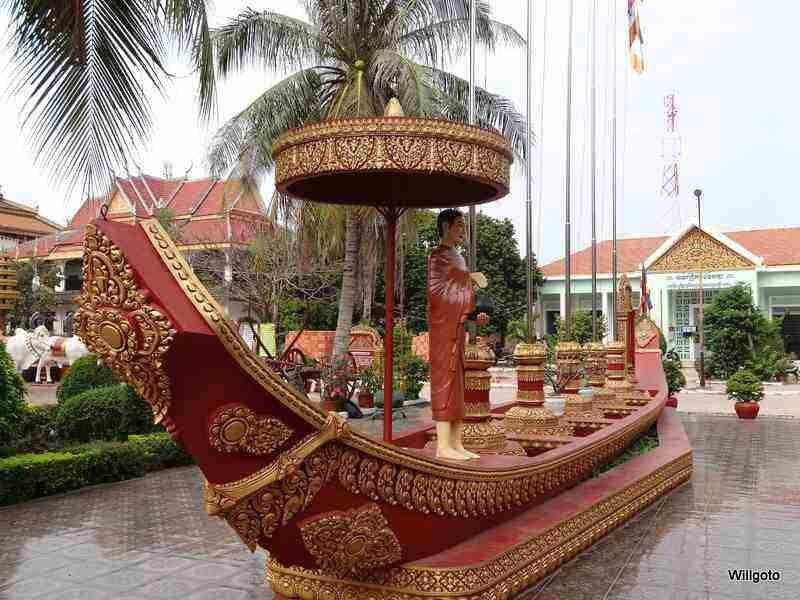
- Publication
- Asian Folklore Studies, Vol. 47, No. 1, pp. 35-41 | Published by Nanzan University
- Published
- 1998
- Author
- Ang Choulean
- Pages
- 7
- Language
- English
pdf 770.0 KB
“Since the ancient Cambodia the main enduring characteristic in the elaboration Khmer religious thought was the search for harmony between animistic foundation and Indian philosophico-spiritual contributions”, writes the author. “With the adoption of Theravada the system acquires its ultimate enrichment. While preserving the elements of its Brahmanic inheritance, Theravada succeeded in inculcating a strong preoccupation with moral and spiritual matters, even among the most common strata of the society.”
In this short yet vivid description of the typical Cambodian monastery (vihear), the author shows how local spirits (anak ta, bray...) are present in the sacred territory delimited by the sima. About the bray spirit (often inhabiting the racing pirogue stored within the monastery), he remarks: “Here we see how a female spirit of inauspicious death arrogates, so to speak, Buddha’s supernatural powers to herself. Indeed it is the vihar itself which shelters a bray and accepts her as a guardian.”
Photo: The monk Preah Ang Chan-han Hoy and his legendary pirogue at Wat Preah Prohm Rath, Siem Reap, Cambodia (by willgoto).
Tags: Khmer religion, Theravada Buddhism, animism, syncretism, female spirits
About the Author
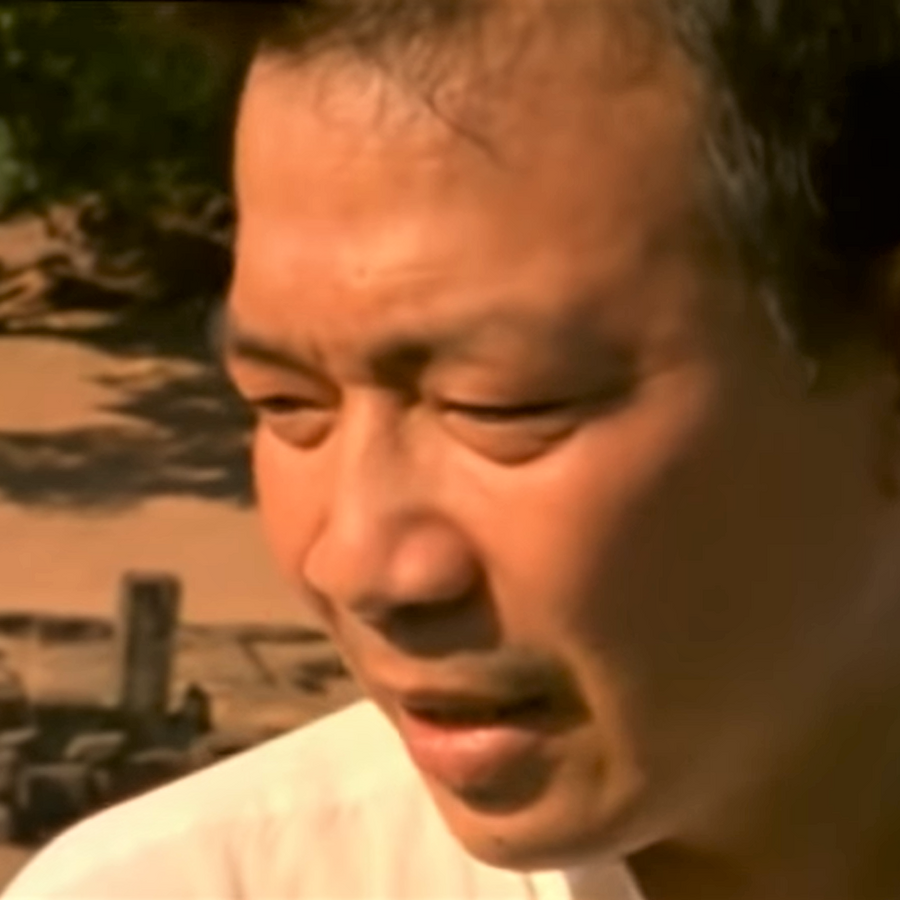
Ang Choulean
Ang Choulean អាំង ជូលាន (1 Dec. 1949, Kompong Kleang, Cambodia) is a Cambodian independent ethnologist, a professor of historical anthropology and Old Khmer at the Royal University of Fine Arts, Faculty of Archaeology, and a former Director of the Department of Culture of APSARA Authority, remaining a special advisor to the entity in charge of Angkor Archaeological Park.
With a BA in archaeology from Phnom Penh University (1974), Ang Choulean graduated from EHESS (Ecole des Hautes Etudes en Sciences Sociales) in 1976, where he obtained a PhD in ethnology in 1982. He was the second Cambodian national to be granted the Fukuoka Grand Prize in 2011.
Ang Choulean is the author of numerous academic papers and books, including an ethnographic essay on food and village life in the Angkor area (La cuisine rurale d’Angkor, in Khmer and French, Phnom Penh, 2020), and academic presentations. He conducted numerous field research in the Angkor area. He developed a new approach to traditions, myths, ancient rituals and spirituality in the daily life of Cambodian countryside.
More about the author:
- Prof. Ang Choulean reflections on reading, education and the need for scholarly debate in Cambodia (Khmer Times, 3 May 2023),
- “Ethnologist Ang Choulean: the Rich and Complex World of Spirits in Cambodian tradition” (Cambodianess, 20 March 2022),
- About “Them” and “Us”, a plead for universalism (Cambodia Living Arts, 3 March 2021 on Facebook).
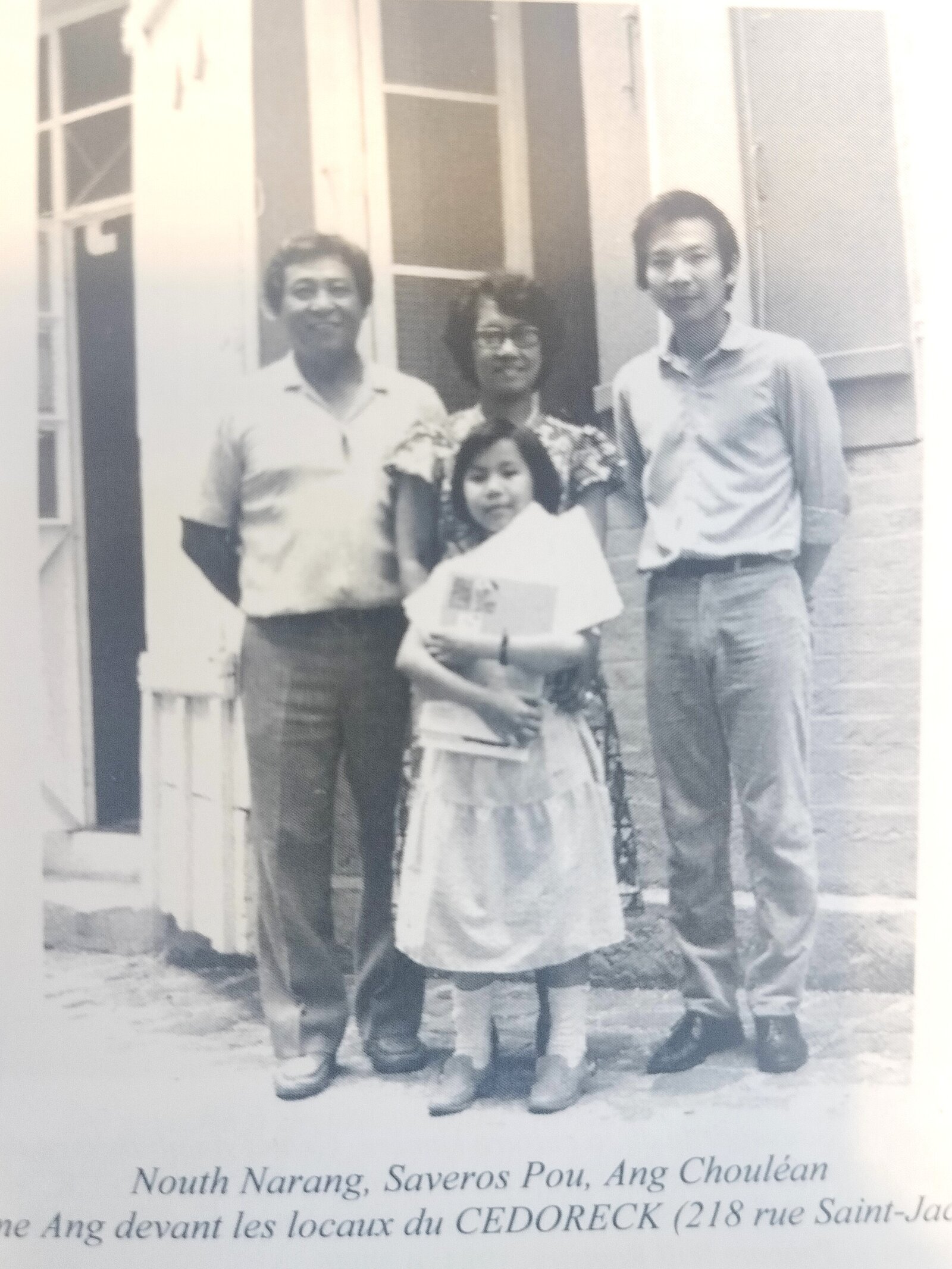
Publications
(list courtesy of Prof. Ang Choulean)
- Catalogue des pièces en bois du Musée national de Phnom Penh, Phnom Penh: Université des Beaux-Arts, mémoire dactylographié de fin d’études, 1973, 174 p.
- Le monde surnaturel cambodgien d’après un manuscrit de la Commission des Moeurs et Coutumes du Cambodge, Mémoire de diplôme de l’EHESS, Paris, 1976.
- “Le philtre sneh. De la femme humaine à la femme surnaturelle”, Seksa Khmer, n° 1 – 2, Paris 1980, pp.155 – 202.
- “Grossesse et accouchement au Cambodge : aspects rituels”, ASEMI XIII, 1 – 4, Cedrasemi, Paris 1982, pp. 87 – 109.
- Les êtres surnaturels dans la religion populaire khmère, Cedoreck, Paris 1986.
- “Le sacré au féminin”, Seksa Khmer, n° 10 – 13, Paris 1987 – 90, pp. 3 – 30.
- (with Saveros Pou) “Vocabulaire khmer relatif au surnaturel”, Seksa Khmer, n° 10 – 13, 1987 – 90, pp. 59 – 129.
- “La communauté rurale khmère du point de vue du sacré”, Journal Asiatique, CCLVIII, 1 – 2, 1990, pp. 135 – 154.
- “Apports indiens à la médecine traditionnelle khmère. Considérations préliminaires”, Journal of the European Ayurvedic Society, Vol. 2, Reinbek 1992, pp. 101 – 114.
- “Un rapide survol des rites de passage dans le Cambodge traditionnel”, Kambodschanische Kultur, Berlin 1992, pp. 21 – 27.
- (with TAN Yinh Phong) “Le monastère Khemararam. Espace identitaire de la communauté khmère”, in Jacqueline Matras-Guin and Christian Taillard eds, Habitations et Habitat d’Asie du Sud-Est Continentale, L’Harmattan 1992, pp 285 – 302.
- “Recherché récente sur le culte des mégalithes et des grottes au Cambodge”, Journal Asiatique, CCLXXXI, 1 – 2, Paris 1993, pp. 183 – 210.
- “De la naissance à la puberté. Rites et croyances khmers”, in J. Massard and J. Koubi eds, Enfants et Sociétés d’Asie du Sud-Est, l’Harmattan, Paris 1995, pp. 153 – 165.
- “Le sol et l’ancêtre. L’amorphe et l’anthropomorphe”, Journal Asiatique, CCLXXXIII, 1, Paris 1995, pp. 213 – 238.
- អង្គរ អតីត បច្ចុប្បន្ន និង អនាគត | Angkor, a Manual for the Past, Present and Future, Gouvernement royal du Cambodge, Phnom-Penh 1996 (coed. with E. Prenowitz et A. Thompson of the collective research00 “Zoning and Environmental Management Plan for Angkor, UNDP / UNESCO); French ed. 1997, Khmer ed. 1998.
- “Nandin et ses avatars”, in H. Jessup and T. Zéphir eds., Angkor et dix siècles d’art khmer, Réunion des Musées Nationaux, Paris 1997, pp. 62 – 69.
- “Recherché ethnologique cambodgienne, bref regard”, Dossiers d’Archéologie n 221, 1997, pp. 10 – 11.
- “Les manuscrits khmers, survol thématique”, Kambodschanische Kultur, Nr 5, Berlin 1997, pp. 53 – 62.
- “Un point de mémoire collective dans le Cambodge ancien”, BEFEO, 84, Paris 1997, pp. 334 – 339.
- មនុស្សនិងដី [Hommes et terre], Reyum, Phnom Penh, 2000 (KH, FR, ENG versions).
- ព្រះលិង្គ [Brah Ling], Reyum, Phnom Penh, 2004 (KH, FR, ENG versions).
- “The Human-Nature Relationship Seen Through Animistic Belief and Ritual in Cambodia”, in M. Yamamoto and M. Fujimoto eds., Utaki in Okinawa and Sacred Places in Asia, The Japan Foundation, Tokyo 2004, pp. 58 – 65.
- “La mort-renaissance en abstraction iconographique”, Udaya 5, Phnom Penh, 2004, pp. 85 – 98.
- “Psychologie de l’artisan khmer : une petite pièce à verser dans le grand dossier”, Udaya 6, 2005, pp.187 – 190.7
- “The Linga in all Its Aspects”, Orientations, Vol. 37, n° 8, Hong Kong, Nov-Dec. 2006, pp. 76 – 78.
- “Vom Brahmanismus zum Buddhismus Betrachtungen zum Totenfest in Kambodscha”, in W. Lobo and Helen Ibbitson Jessup, Angkor. Göttliches Erbe Kambodschas, Bonn 2006, pp. 238 – 242.
- “In the beginning was the Bayon”, in J.Clark ed., Bayon. New Perspectives, River Books, Bangkok 2007, pp. 362 – 377.
- “សង្ខេបជំនឿលើព្រះយមរាជនៅប្រទេសកម្ពុជា”, ព្រឹត្តិបត្របុរាណវិទ្យា, លេខ ១, សាកលវិទ្យាល័យភូមិន្ទវិចិត្រសិល្បៈ២០០៧, ទំ. ២៥-៣៨. [“Summary of Beliefs regarding Yama in Cambodia”, Archaeological Bulletin n 1, Royal University of Fine Arts, 2007, pp. 25 – 38.]
- “ដំណើរជីវិតមនុស្សខ្មែរមើលតាមពិធីឆ្លងវ័យ” (និពន្ធរួមគ្នាជាមួយព្រាប ចាន់ម៉ារ៉ា និង ស៊ុន ចាន់ដីប), ហនុមានទេសចរណ៍ ២០០៧ (ផ្សព្វផ្សាយលើកទី២ដោយយសោធរ, ២០១៤) [The Life of Khmer People Seen through the Ages] (with Preap Chanmara and Sun Chandeep), Hanuman Travel, 2007 (2nd ed. by Yosothor, 2014)].
- “Fleurs d’aréquier et la cérémonie du mariage au Cambodge”, Bulletin de l’AEFEK 13, Jan. 2008 (online).
- “កម្រងអត្ថបទក្នុងបណ្តាញពត៌មានវប្បធម៌ខ្មែរ លេខ៧” [Series of articles in Khmer Renaissance no.7], (author with គង់ វីរៈ [Virak Kong], ព្រាប ចាន់ម៉ារ៉ា [Chanmara Preap], ស៊ីយ៉ុន សុភារិទ្ធ [Siyon Sophearith]), Dec 2011-Dec 2012, Khmer Renaissance, 140 p.
- “Est-ce si surnaturel ?”, Péninsule 65, 2012 (2), pp. 83 – 102.
- មូលដ្ឋានរៀន ខ្មែរបុរាណ [Ancient Khmer Studies: Foundations], Phnom Penh, Yosothor, 2013, 289 p, ISBN: 978−99963−818−0−5; 2d ed., 2018.
- “Japan through my eyes”, Renaissance culturelle du Cambodge 28, Sophia Asia Center for Research and Human Development, Tokyo, 2013, pp. 129 – 135.
- សៀវភៅអក្ខរាវិរុទ្ធខ្មែរបុរាណ [Manuel d’épigraphie vieux-khmère], Phnom Penh, Yosothor, 2013.
- “Yay Mau”, in Nasir Abdoul-Carime, Grégory Mikaelian, Joseph Thach (eds): Le passé des Khmers, Peter Lang SA, Berne 2016, pp. 249 – 262.
- “Bringing India to Cambodia: Two Examples of Bridges”, in Anna L. Dallapiccola and Anila Verghese: India and Southeast Asia: Cultural Discourses, The KR Cama Oriental Institute, Mumbai 2017, pp. 72 – 82.
- “Le tamarin dans la cuisine des villages d’Angkor. Des mémoires de Zhou Daguan à aujourd’hui”, in Marie Aberdam and Téphanie Sieng eds., Le patrimoine au Cambodge, Anciens rites, nouveaux usages et enjeux d’appropriation, Moussons, n° 30, 2017, pp. 185 – 202.
- អហរេនជនបទអងគរ / Cuisine rurale d’Angkor [Rural Cuisine of Angkor], Yosothor, Phnom Penh 2020 (in Khmer and French), ISBN: 978−99249−394−0−5.
- “Le terrain ethnographique à l’appui. Le premier mois dans l’ancien Cambodge et la fête des prémices du riz”, in N. Abdoul-Carime, E. Bourdonndeau, G. Mikaélian, J. Thach eds, Temporalités khmères : de près, de loin, entre îles et péninsules, Peter Lang, 2021, pp. 197 – 219.
- “Nostalgia or Appropriation of the South?”, in Sonya Rhie Mace and Bertrand Porte eds, Revealing Krishna, The Cleveland Museum of Art (in association with D Giles Limited), London) 2021, pp. 163 – 174.
- សត្វលោក [Creatures], Yosothor, Phnom Penh 2021, 147 p. ISBN-13: 978−9924−9394−1−2.
- [with ជី រដ្ឋា Ratha Gi, គង់ វីរៈ Virak Kong, ព្រាប ចាន់ម៉ារ៉ា Chanmara Preap], ស៊ីយ៉ុន សុភារិទ្ធ Siyonn Sophearith, ហេង សុផាឌី Sophady Heng, និង សួង សុខរ៉ូ Sokro Soung]កម្រងអត្ថបទ លេខ១៦ [Series of articles no. 16] ), ផ្សព្វផ្សាយដោយយសោធរ, Yosothor, Phnom-Penh 2021,124 p. ISBN: 978−9924−9286−1−4 :16.
- “ក្តី”, ព្រឹត្តិបត្រសាកលវិទ្យាល័យភូមិន្ទវិចិត្រសិល្បៈ, លេខ៤, ២០២១ ៖ ៩‑១៤. [“Kdei”, Royal University of Fine Arts Bulletin, n 4, 2021, pp 9 – 14.
- “Cuisine domestique en « pays de marché » de la région d’Angkor. Le cas de Roluos”, Bulletin de l’AEFEK 25, Jan. 2023 (online).
- “Yama, the God Closest to the Khmer”, in M. Hendrickson, M. Stark, D. Evans eds, The Angkorian World, Routledge, 2023, pp. 614 – 628.
- [author with ចាន់ម៉ារ៉ា ព្រាប [Chanmara Preap], វីរៈ គង់ [Virak Kong], ស៊ីយ៉ុន សុភារិទ្ធ [Siyon Sophearith], សុខរ៉ូ សួង [Sokro Soung], សុផាឌី ហេង [Sophady Heng]] កម្រងអត្ថបទក្នុងបណ្តាញពត៌មានវប្បធម៌ខ្មែរ លេខ១៩ [Essay Collection Khmer Cultural Information Network Series No. 19, Phnom Penh, Yosothor, 2024, 130 p.
- [with ជី រដ្ឋា Ratha Gi, គង់ វីរៈ Virak Kong, ព្រាប ចាន់ម៉ារ៉ា Chanmara Preap, ស៊ីយ៉ុន សុភារិទ្ធ Siyonn Sophearith, ហេង សុផាឌី Sophady Heng និង សួង សុខរ៉ូ Sokro Soung] កម្រងអត្ថបទ លេខ១៩ [Series of articles no. 19], ], ផ្សព្វផ្សាយដោយយសោធរ Yosothor, Phnom Penh, 2024, 130 p. ISBN: 978−9924−9286−1−4.
- “យល់បាតុភូតអស្ចារ្យ”, UDAYA 16, Phnom Penh 2025, p. 51 – 68.
- ប្រវត្តិសាស្ត្រកម្ពុជាសម័យអង្គ័រ (មូលដ្ឋានរៀននិងស្រាវជ្រាវ) [The History of Cambodia during the Angkor Period (Foundation study and research)], Yosothor, Phnom Penh, 2025. ISBN: 978−9924−9491−6−9.
Conference contributions
- La place de l’animisme dans le bouddhisme populaire khmer. Exemple du monastère bouddhique, XXXIId ICANAS [International Congress of Asian and North African Studies], Hambourg, Aug. 1986.
- Culte des mégalithes et des grottes au Cambodge, XXXIIId ICANAS, Toronto, Aug. 1990.
- Les rites de passage khmers, Kambodscha-Seminar, Humboldt University, Berlin, Nov. 1991.
- Khmer Manuscripts. A Thematic Overview, Workshop “SEA Manuscripts”, KITLV, Leiden, Dec. 1992.
- Oudong, ancienne capitale, Centre Culturel Français, Phnom Penh, Jan. 1994.
- Historique de la gestion d’Angkor (in Khmer), Colloque de Khmérologie, Phnom Penh University, Aug. 1996.
- The Watershed of the 9th Century : A Collective Memory, Sixth International Conference of European Association of SEA Archaeologists, Leiden, Sept. 1996.
- Managing Angkor Today, Sixth Seminar on the Conservation of Asian Cultural Heritage, Nara, Oct. 1996.
- Le Neak Ta (in Khmer), Sophia University, then Waseda University, Tokyo, Nov. 1996.
- Recherché ethnologique au Cambodge: état des lieux, Colloque “Angkor, nouvelles approches de la civilisation cambodgienne”, Paris, Feb. 1997.
- Representation of death and the hereafter in Khmer culture, Conference “Recent Studies in the History of Cambodian Art”, Center for Advance Study in the Visual Arts, National Gallery of Art, Washington DC, Sept. 1997.
- Perpetual Recreation. Remodeling of Time and Space, Seventh International Conference of European Association of SEA Archaeologists, Berlin, Sept. 1998.
- Human Nature and Ancestor Spirits, Lectures and Seminars “Cultural conceptions of human nature and personhood”, Department of cultural Anthropology and Ethnology, Uppsala University, Sept. 1998.
- Politics of Religion and Current State of Buddhism in Cambodia, Department of History of Religions, Uppsala University, Sept. 1998.
- L’espace humanisé et son fondateur, Nara National Cultural Properties Institute, Nara, Nov. 1998.
- Brief History of Angkor, Nara Women’s University, Nara, Dec. 1998.
- Angkor : la science, la tradition et leur défi pour les Khmers, 3rd Bayon Symposium by JSA-UNESCO, Siem Reap, Dec. 1998.
- The choice of Angkor as royal capital (9th-15th c.), “Preserving architecture in ancient cities and sacred places”, Symposium by World Bankl, Washington DC, May 1999.
- Angkor. La vision khmère en déperdition et perspectives d’avenir (in Khmer), presentation at Sophia University, Tokyo, Feb. 2000.
- People and Earth, presentation at Reyum Gallery for the opening of the exhibition People and Earth, Phnom Penh, March 2000.
- Le Reamker dans la vie quotidienne, presentation at Reyum Institute of Arts, Phnom-Penh, Sept 2002 (in Khmer and French); and at Department of South and Southeast Asian Studies, University of California, Berkeley, Oct. 2002 (in English).
- The challenge of Angkor tourism, Università di Bologna, Nov. 2002.
- La mort et ses allégories, presentation in two parts at Séminaire du Professeur Georges Condominas, Ecole des Hautes Etudes en Sciences Sociales, Paris, 6 and 20 May 2003.
- Eclipse : Time, Death and Renewal in Cambodia, lecture at Center for International Studies, The University of Philippines Diliman, Manila, 9 Jan. 2004.
- An abstract notion of “divinity”, International Symposium “Cultural Heritage, Identity and Information Technology”, set by Sophia University (Tokyo), Siem Reap, 12 March 2004.
- Human – Nature relation seen through animistic belief and practices, Okinawa International Forum 2004 (theme: “Utaki in Okinawa and Sacred Spaces in Asia : Community Development and Cultural Heritage”), Okinawa, 27 March 2004.
- A proposed database for a systematic inventory of Angkor Intangible Heritage, Advanced Digital Technology-Assisted Cultural Archives and Preservation Along the Maritime Silk Road, Seminar organized by the JSPS and the National Institute of Informatics, Tokyo, 24 July 2004.
- Brah Ling, presentation at the opening of the exhibition Brah Ling – Le rappel des âmes, Reyum Institute of Arts, Phnom Penh, Aug. 2004 (in Khmer and English).
- Riceballs as an Indian Legacy in Khmer Ritual, Center for Southeast Asian Social Studies, University of Gadjah Mada, Yogyakarta, Janvier 2005.
- La “réclusion dans l’ombré”, rite de nubilité féminine, presentation at Séminaire du Professeur Georges Condominas, Ecole des Hautes Etudes en Sciences Sociale, Paris, 17 May 2005.
- The spade Chumnik : from cultivation to culture, National Gallery of Art, Washington DC, 9 Nov. 2005.
- Fusion with the divine, SEASREP 10th Anniversary Conference, Chiang Mai, 9 – 7 Dec. 2005.
- The Kuy, their possible contribution to the Angkor power, Cultural heritage: Thais and their neighbours, conference held jointly by Silpakorn University, Thai Fine Arts Department, and SPAFA, Silpakorn University Alumni Association, Silpakorn University, Bangkok, 23 June 2006.
- The intangible heritage of Angkor, keynote address, “Conference on New Directions in Research at Angkor”, Université de Sydney, 21 juillet 2006.
- Can myths be neglected?, keynote speaker au TAASA Symposium sur le thème “Angkor: Artefacts to Empire”, University de Sydney, 22 juillet 2006.
- Yama in present-day Cambodia: an introduction, at Syncretism in South and Southeast Asia, Adoption and Adaptation, The 2nd SSEASR Conference, Mahidol University, Nakhon Pathom, Thailand, May 2007.
- Breaking-off and continuity: from ancient to present-day Cambodia, Hawaii and Cambodia: Revitalizing and Sustaining Connections, conference held jointly University of Hawaii at Manoa and the East-West Center, Honolulu, 10 Nov. 2007.
- Related beings: rice and human, Center for Southeast Asian Studies, Kyoto University, 17 July 2008.
- Merging Buddhism to Animism. An Example of Rice Cultivation Ritual in Angkor Area, Sophia University, Tokyo, 29 July 2008 (in Khmer).
- Alcohol, expression of the divine, Center for Southeast Asian Studies, Kyoto University, 24 Sept .2008.
- Brothers Kuy, Center for Asian Legal Exchange, Nagoya University, 27 Sept. 2008 (in Khmer).
- Living with heritage at Sambor Prei Kuk, Seminars on intangible cultural heritage in Cambodia, The University of Sydney Robert Christie Research Center, Siem Reap, 30 Nov. 2008.
- Les gens de Banteay Chhmar (in Khmer), Deuxième conférence international sur Banteay Chhmar, Sisophon, 10 Aug. 2009.
- The Adoption of Hindu Religion in Early Historic Time of Cambodia: The Linga as a Bridge, International Conference on Bujang Valley and Early Civilizations in Southeast Asia, Department of National Heritage / Universiti Sains Malaysia, Kuala Lumpur, 5 July 2010.
- The Intangible Heritage in Angkor Area: toward a Balanced Care?, Reconstruction Process and Cultural Heritage, National Research Institute for Cultural Properties, Tokyo, Jan. 2011.
- Les sites historiques et les populations locales (in Khmer), Cambodia-Japan Cooperation Center, Phnom Penh, 6 Aug. 2011.
- Cambodia: the multifaceted link between tangible and intangible heritages, Kyushu University, Japan, 17 Sept. 2011.
- The amorphous gods of Japan seen from faraway Cambodia, Public Forum, Fukuoka, 18 Sept. 2011.
- L’alcool, c’est divin. Bière et eau-de-vie de riz : leur nature dans le rituel au Cambodge, Séminaire du Centre Asie du Sud-Est, CNRS, Paris, 17 Nov. 2011.
- Vivre avec le patrimoine antique, colloque “Quelles sciences pour le pays khmer ? Approches empiriques et théoriques”, Inalco, Paris 25 Nov. 2011.
- Les études khmères : règles élémentaires à adopter (en khmer), Séminaire “Conservation et développement culturels : le patrimoine culturel khmer” held by Académie Royale du Cambodge-Royal Academy of Cambodia, Phnom Penh, 8 Dec. 2011.
- Japan through my eyes, International Symposium on Khmerology titled “From Cambodia to the World”, held by Sophia Asia Center for Research and Human Development, Phnom Penh, Jan. 2012.
- The “supranatural” in everyday life, Religious Studies in Cambodia: “Understand the Old and Trace the New”, conference held by APSARA Authority, EFEO, CKS, Sydney University, Siem Reap, June 2012.
- Connectivity: A rapid glance on Cambodia, keynote speaker at 38th seminar on Southeast Asia held by the Center for SEA Studies (Kyoto University), Siem Reap, 22 Nov. 2014.
- - Yeay Mao : La mémoire et son contre-pied, Colloque international sur le Cambodge : la conscience du passé chez les Khmers et leurs voisins, Faculty of Archology, RUFA, Phnom Penh, 15 – 17 Dec. 2014.
- Two examples of bridges bringing India to Cambodia, seminar titled “Cultural Dialogues Between India And Southeast Asia From The 7th to The 16th Centuries”, The K. R. Cama Oriental Institute [named after Parsi scholar Kharshedji Rustomji Cama], Bombay, 17 – 18 Jan. 2015.
- Rice Cycle, Human Cycle: an Example from Sambaur Prei Kuk, Cambodia, “Seminar and Performances” held by SEAMEO-SPAFA, Bangkok, May 2015.
- L’ethnographie à l’appui, symposium held by Inalco et al., Projet Camnam, Paris, Nov. 2017.
- Le fin du fin : l’absence d’images, international symposium held by Université Paris Lumières and workshops-laboratories by Idéfi-CréaTIC, Metz, Dec. 2017.
- Yama, the God of Justice and the Afterlife over Cambodian Religious History, Center for Southeast-Asian Studies, SOAS, London, 20 June 2018.
- Faint recollection of forgotten myths in some Khmer rituals, seminar held by SEAMEO-SPAFA, Bangkok, Juin 2024.
- ដើម ៖ កំណើត, តជំនាន់, ភ្ជាប់ភព, a lecture co-organized by Yosothor and RUFA, Phnom Penh, 5 July 2024.
- បាតុភូត ‑អស្ចារ្យ- [Les manifestations surnaturelles], 2‑part lecture at Ecole Française d’extrême-Orient, Siem Reap, 18 July 2024.
- Le mythe du Lac Anavatapta. Traduction monumentale et rituelle, Présence des Etudes Khmères, journée d’études held by AEFEK / AMIYOS, Institut National des Langues et Civilisations Orientales, Paris, Sept. 2024.
- The Bayon and the myth on the foundation of Cambodia, keynote speaker at the JSA/JASA 30th Anniversary Symposium, Toyo 1st Feb. 2025.
Fiction
- សត្វលោក [Satvalok], novel in Khmer, Phnom Penh, Yosothor, 2021.
- អាស្បូវ [A Sbov], historical novel in Khmer, Phnom Penh, Sipar, 2022.
Co-edition
- Udaya, scientific journal of Khmer studies, initially published by APSARA Authority, then by Friends of Khmer Culture, currently by Yosothor.
- KhmeRenaissance, Khmer cultural website since 2005, currently produced by Yosothor and the Royal University of Fine Arts (RUFA) [104 short contributions by A.C. to date].
Filmography
- Producer (concept and script) of Gens d’Angkor, ethnographic film (45mn) screened at roving exhibition of Khmer Art, Bonn, Berlin, Zürich, 2006.
Selected translations
- Translation from English and French to Khmer of several books and articles by George Coedès, Bernard-Philippe Groslier, Mireille Bénisti, Bernard Dupaigne, Vann Molyvann.4
- Translation-adaptation from French to Khmer of L’histoire terrible mais inachevée de Norodom Sihanouk, Roi du Cambodge by Hélène Cixous.
And also: Liber amicorum, mélanges réunis en hommage à Ang Chouléan [Liber Amicorum in Honor of Ang Choulean កម្រងអត្ថបទរំលឹកគុណចំពោះលោកគ្រូអាំងជូលាន], eds Grégory Mikaelian, Siyonn Sophearith, Ashley Thompson, Phnom Penh/Paris, Association des Amis de Yosothor and Péninsule, 2020, 442 p, ISBN 9782353214099.

